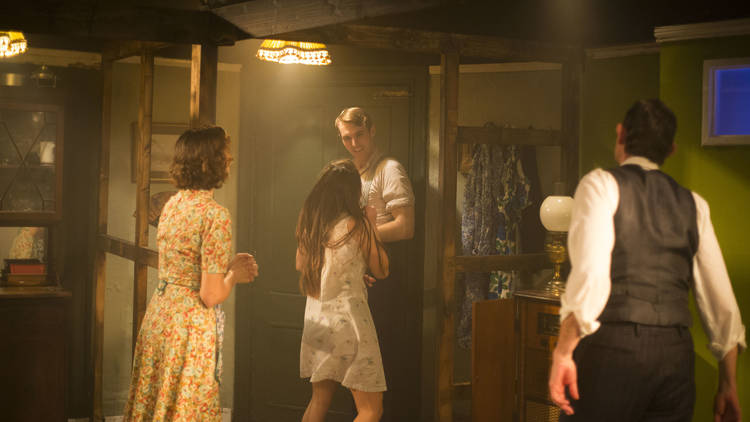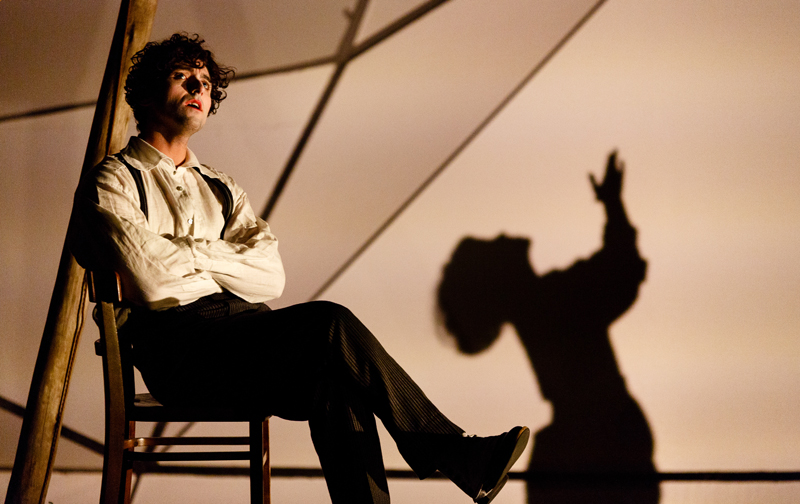In the next of our chats with members of the cast and creative team of the very first production of The Merchant of Venice to be staged in the Venice Ghetto itself, Judi Herman talks to Welsh actress Jenni Lea-Jones, who has relocated to Venice and is perhaps the most unusual of the five performers sharing the role of Shylock in the show they are calling The Merchant in Venice. Apologies for the quality of the line at the start of this conversation, which happily soon improves.
JR OutLoud: Frank London talks to JR about composing for The Merchant in Venice at Venice Ghetto 500
In the next of our chats with members of the cast and creative team of the very first production of The Merchant of Venice to be staged in the Venice Ghetto itself, Judi Herman talks to Frank London, composer and musician. The Grammy-winning trumpeter and composer, founder of the Klezmatics and leader of bhangra/Yiddish group Sharabi (with Deep Singh), Shekhinah Big Band, and his Klezmer Brass Allstars is no stranger to large-scale collaborative projects, or of course to Jewish-themed work. Here he talks about the musicians who are working with him on this project and his inspirations for the music that will be heard in the Ghetto.
See Alexandra & Nikole Stoica, the twin violin virtuosos from Romania that Frank talks about, who will play in the production: www.youtube.com/watch?v=jmg-mPSAeCE
Hear music by Salomone Rossi (his beautiful Kaddish – the mourner's prayer), the 17th-century, Italian-Jewish composer, who was one the inspirations that Frank mentions: www.youtube.com/watch?v=aBBXYsdt8Jk
Interview: Shaul Bassi discusses the mock appeal to be heard alongside Shakespeare’s Merchant of Venice, which is being performed in the Venice Ghetto for the first time
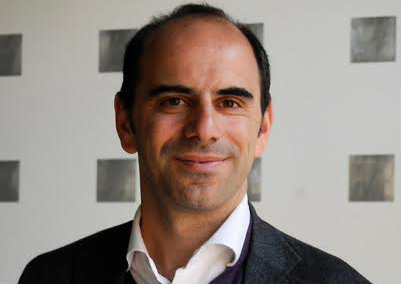 In July, as Shakespeare’s The Merchant of Venice is performed in the Venice Ghetto for the very first time, a trial featuring advocates for Shylock, Antonio and Portia will take place in Venice’s Scuola Grande di San Rocco. Will it overturn the verdict from the play, in which Shylock is tried, found guilty of threatening the life of a Venetian, and then fined and forced to convert to Christianity? Shaul Bassi, director of Beit Venezia: A Home for Jewish Culture, and one of the movers behind the city’s Jewish cultural events this year, reveals his side of the story.
In July, as Shakespeare’s The Merchant of Venice is performed in the Venice Ghetto for the very first time, a trial featuring advocates for Shylock, Antonio and Portia will take place in Venice’s Scuola Grande di San Rocco. Will it overturn the verdict from the play, in which Shylock is tried, found guilty of threatening the life of a Venetian, and then fined and forced to convert to Christianity? Shaul Bassi, director of Beit Venezia: A Home for Jewish Culture, and one of the movers behind the city’s Jewish cultural events this year, reveals his side of the story.
"It is more accurately a mock appeal," explains Bassi. "A wonderful companion piece to the production. And it’s to be held in one of the most prestigious and breathakingly beautiful venues in Venice, the Scuola Grande di San Rocco, almost entirely decorated by Tintoretto.
We’re not going to see the play’s characters. It is a mock appeal, so we’re going to have three advocates for Shylock, Antonio and Portia. Each will present a case for Shylock, Antonio with the Republic of Venice and Portia.They will try to persuade a jury of five real judges that they should reverse or confirm the verdict of the trial in the play. It’s a kind of legal sequel."
The verdict of the play could be overturned. How does Portia come to be represented?
"The idea was to keep Antonio and Shylock as the plaintiff and defendant, but one of the lawyers working on the project said there’s a case to be made that the whole legal procedure of the play was illegal because Portia was practising the law without a licence. That adds to the fun."
Who is the presiding judge?
"Judge Ruth Bader Ginsburg, Associate Justice of the Supreme Court of the United States, a legal eagle and public icon for human and civil rights in the States and beyond. We’re privileged to have her offering a contemporary dimension to our discussion.
There’s no Jewish majority in the jury. Everyone is coming here with the idea of being even-handed, but also to do their best to help the audience see al the legal and ethical implications of the play from all possible angles."
You’re also going to share what you’ve found out about Venetian merchants and the law in Shakespeare’s time…
"We’re going to have a small presentation on arbitration in early modern Venice – at that time it wasn’t a good idea to go to trial. Merchants went out of their way not to go to trial when they had a dispute to settle! They would try to resort to arbitration and the funny thing I’ve learned is that there was even a verb ‘palazzare’ which meant to go to the Palazzo Ducale for trial, which was the one thing they wanted to avoid at all possible cost."
The line up of internationally famous guests contributing to the evening doesn’t stop with Judge Ruth Bader Ginsburg, doesn't it?
"We’re going to be blessed with the presence of actor F Murray Abraham, a celebrated Shylock in the United States. He is not part of the production but of the documentary series Shakespeare Uncovered, so he’s going to lead discussion on certain aspects of the play and read out extracts. And we’re also blessed with the presence of two of the most brilliant Shakespeare scholars, James Shapiro, who wrote Shakespeare and the Jews; and Stephen Greenblatt, who has really changed the history of Shakespeare criticism."
So how will they fit into the evening?
"Each will give a little speech on the play and the three lawyers will present their case for 15-20 minutes each with questions and answers from the jury and finally we’re going to find out what’s going to happen because there’s no script. We have a structure but there’s no forgone conclusion.
All this (the trial alongside the performances of The Merchant of Venice) would not be possible without these people who really understand the uniqueness of of this moment 500 years since the creation of the Ghetto, 400 years since Shakespeare’s death. It’s an amazing coincidence, which we also wanted to use to reflect. Talking about today, it’s also about the role of foreigners in any society – the extent you’re prepared to change society to accommodate them, to expel them once they become a disturbing presence – it’s a very topical play."
How can we watch the proceedings?
"Tickets are understandably limited, but we’re going to film it."
What is your role in the production of The Merchant of Venice, as well as the events surrounding it?
"I am Associate Professor of English Literature at Ca’ Foscari University and this production and concept was conceived at the university. This very fruitful collaboration between our university and Compagnia de’ Colombari, an international theatre company, is not an academic production. It’s multi ethnic (it includes American, British, Croatian, French, Indian and Italian actors) and colour blind and to some extent gender blind. And people have brought their legal knowledge to the table. first and foremost Justice Ginsberg, so it’s a great collaborative project. It’s also winner of a Creative Europe project that included two British Universities, Queen Mary College London and Warwick University and the programme Global Shakespeare. We’ve been working together to show how Shakespeare is relevant throughout Europe."
What will be the legacy of these extraordinary events?
"We’re going to turn all the artistic material, the outcomes of both the trial and the production into educational material. The main goal for dissemination of the project will become a resource for people interested in the play that we’ve called the Shylock Encyclopedia. It will be online and the idea is that it’s really accessible to everybody and maybe it will also be a sort of open encyclopedia that one can add posts to. We want to put everything at the disposal of students, scholars, actors and directors, whoever wants to deal with this most controversial of plays for years to come."
By Judi Herman
Find more interviews with members of the Venice Ghetto production of The Merchant of Venice on JR OutLoud. Or visit www.themerchantinvenice.org for further info.
JR OutLoud: Table tennis champ Jeff Ingber talks about travelling the world playing the beautiful game
Jeff Ingber, table tennis champion for decades from the mid-20th century and one of Howard Jacobson's heroes, met up with JR's arts editor Judi Herman at the exhibition Chess in Shorts that accompanies the production of the Mighty Walzer at Manchester’s Royal Exchange Theatre. Ingber told Judi about playing the other beautiful game in Manchester and how it was his passport to travel the world, from Israel to China.
Chess in Shorts, an exhibition by Howard Jacobson and Manchester Jewish Museum, runs until Saturday 30 July, FREE, at the Royal Exchange Theatre, Manchester, M2 7DH. www.royalexchange.co.uk
The Mighty Walzer runs until Saturday 30 July, 7.30pm & 2.30pm, £8-£16, at Royal Exchange Theatre.
Read our review of The Mighty Walzer and our interview with the show's playwright and actor, Simon Bent and Elliot Levey.
Review: The Mighty Walzer ★★★★ – Howard Jacobson’s comedy of table tennis and Jewish teenage angst in 1950s Manchester comes home in triumph
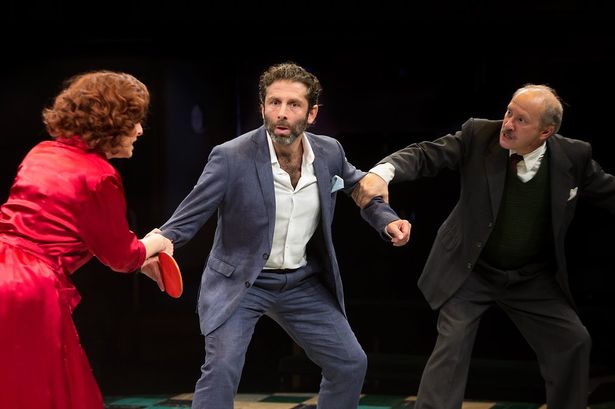 From the moment Elliot Levey ‘s Oliver Walzer bounds on stage and takes in the 360 degrees of audience seated around him, the warmth and inclusivity of Jonathan Humphreys’ perfectly-cast production works its magic, taking its audience back to 1950s Jewish Manchester, conjuring it up with what seems like just a few props and sound effects.
From the moment Elliot Levey ‘s Oliver Walzer bounds on stage and takes in the 360 degrees of audience seated around him, the warmth and inclusivity of Jonathan Humphreys’ perfectly-cast production works its magic, taking its audience back to 1950s Jewish Manchester, conjuring it up with what seems like just a few props and sound effects.
Simon Bent’s adaptation is extraordinarily faithful to the spirit and narrative of Howard Jacobson’s now classic comic novel of teenage angst and table tennis. He has a lovely knack of putting the right words into the right mouths to bring to life incidents described by the narrator in the novel. The comic tale of Oliver’s larger-than-life father Joel’s own attempt at competitive ‘sport’, entering the World Yo-yo Championship armed with his homemade, ridiculously outsized yoyo, makes for a delicious opening narrative, shared by Oliver and his parents, batting retorts to each other like a game of verbal ping pong. Jonathan Tafler’s ebullient Joel and Tracy-Ann Oberman’s beautiful portrait of warm and worried Sadie, staying just the right side of classic Jewish mother, work wonderfully together as a sort of marital double act – can’t live together, can’t live apart. And Bent has come up with a wonderfully theatrical device for Oliver’s houseful of aunties. Not only are they reduced to just two, but both are played by the same great character actor, Ann Marcuson. She has a lot of fun as strangely identical love rivals Dolly and Dora, who of course are never seen onstage together …
Levey’s Oliver is also a 180 degree rounded creation. Bearded so that he recalls his creator Jacobson as gently as he recalls his youth, he engages with his eccentric family and all the denizens of his past, entering his own youth with all the hindsight of middle age, and the crisis he is negotiating, and brokering the deal between audience and action.
Oliver is backed up by a wonderfully eccentric gang of nerds, the ping pong posse into whose ranks he breaks so spectacularly during one memorable day at the local Jewish social club. The actors deftly create these individual young men but at the same time subsume their personalities as necessary to create the gang of nerds Oliver joins. So let’s hear it for Ilan Goodman aka Aishky, James Parris’s Twink, Joe Coen’s Sheeny Waxman and Daniel Abelson (niftily doubling as Uncle Motty and RoyBoy a (non Jewish) rival at the ping pong table) – and not forgetting David Grellin as destructive eminence grise, veteran player and serial Auntie seducer Gershom Finkel.
They are all totally convincing as driven, obsessive, competitive - and highly skilled - table tennis players. The game itself is brilliantly realised by bats on thin threads descending from the flies to be grasped and wielded by eager and expert hands. The balls themselves are simply sound effects – made, in a brilliant coup de theatre, by cast members breathing through microphones. Ben and Max Ringham are responsible for this and all the other highly effective soundscapes.
James Cotterill’s set goes for that very best of strategies for theatre in the round – selective realism, with judicious use of props and effectively enhanced by Lizzie Powell’s lighting. So audience attention focuses for example on the high cistern lavatory, the teenage Oliver’s refuge where he pores over his soft porn mags, keeping his infuriated father safely on the outside.
Perhaps the most spectacular focus is the van off the back of which Dad Joel sells his ‘swag’ – the rubbish souvenirs and novelties, cheap toys and trinkets with which he hopes to make his fortune. It’s wonderfully detailed – full of enticing stuff and brilliantly lit - a great background to the rollicking sales pitch of Joel and his acolyte Sheeny Waxman (Coen really relishes channelling Waxman’s gift of the gab here). And then – lights, camera, action – it’s replaced by a glowing, spectacularly-lit catwalk down which Lorna Peachley, the frighteningly desirable shiksa (non-Jewish girl) after whom Oliver lusts, sashays with her tennis racket – a perfectly pitched performance from blonde (and actually Jewish!) Mancunian Lily Sarcofsky!
But when it’s actually necessary to fill the stage – for example with cardboard boxes towards the end when the family is faced with having to pack up and move away, it all happens with consummate smoothness. For Bent wisely takes his action only as far as Oliver’s offer of a place at Cambridge, leaving the audience in the warm bubble of 1950s Manchester he and the company have so perfectly created to share with their audience.
It’s a marvellously detailed portrait of the life, loves, lusts and complexes of a Jewish teenage boy, perfectly evoking a particular time and place and bringing it to life, but actually subtly nuanced just because it’s seen through the lens of experience. And it’s warmly inclusive too – just enough Yiddishisms to get the feel right but always accessible from the context – you don’t have to be Jewish! Bent and Humphreys have done Jacobson and Jewish Manchester proud and they can kvell (Yiddish: express pride) over a job well done.
By Judi Herman
The Mighty Walzer runs until Saturday 30 July, 7.30pm & 2.30pm, £8-£16, at Royal Exchange Theatre, Manchester, M2 7DH. www.royalexchange.co.uk
Howard Jacobson and Sherry Ashworth appear in conversation on Monday 11 July, 7pm, £5, at Royal Exchange Theatre.
The Mighty Walzer Walking Tour runs Sunday 17 – Thursday 28 July, 10.30am, £7, at Manchester Jewish Museum, M8 8LW; 084 3208 0500. www.manchesterjewishmuseum.com
Chess in Shorts, an exhibition by Howard Jacobson and Manchester Jewish Museum, runs until Saturday 30 July, FREE, at the Royal Exchange Theatre.
Read our interview with The Mighty Walzer's playwright and actor, Simon Bent and Elliot Levey as well as hearing our podcast with table tennis champion Jeff Ingber.
JR OutLoud: Davina Moss talks to JR about her role in the production they're calling The Merchant in Venice at Venice Ghetto 500
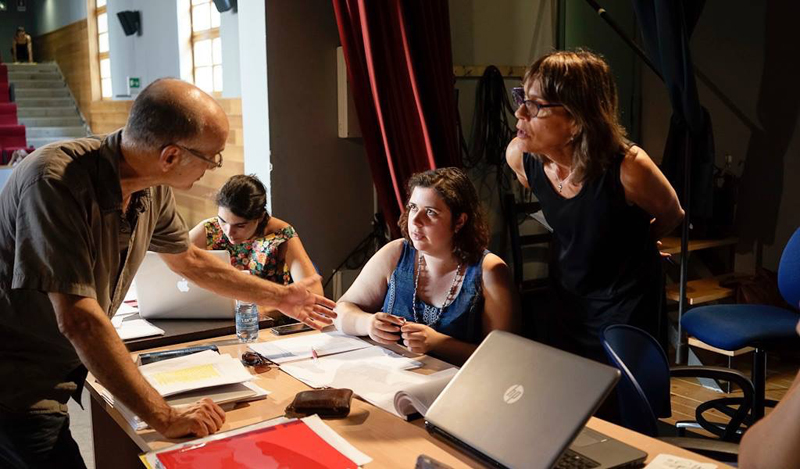 An update from Italy: Davina Moss writes:
An update from Italy: Davina Moss writes:
"Rehearsals are going well! We’ve gone from table work to staging and it’s important to figure out the geometry of the space. Everyone is very excited with how the project is progressing and we’re making some very cool discoveries in the rehearsal room. In this photograph you see us debating over a line in the trial scene, which different versions of the play have different wordings for."
As the celebrations to mark the 500th anniversary of the Venice Ghetto continue, excitement mounts over the first ever performances of Shakespeare’s The Merchant of Venice in the Ghetto itself (26-31 July). In the next of a series of interviews with members of the cast and creative team, JR's arts editor Judi Herman talks to Londoner Davina Moss, currently studying dramaturgy at university in New York, to find out more about her role as assistant dramaturg on this unique production.
Visit www.themerchantinvenice.org for more info.
Review: No Villain ★★★★ – The world premiere of a vital addition to Arthur Miller’s canon of work – his very first play
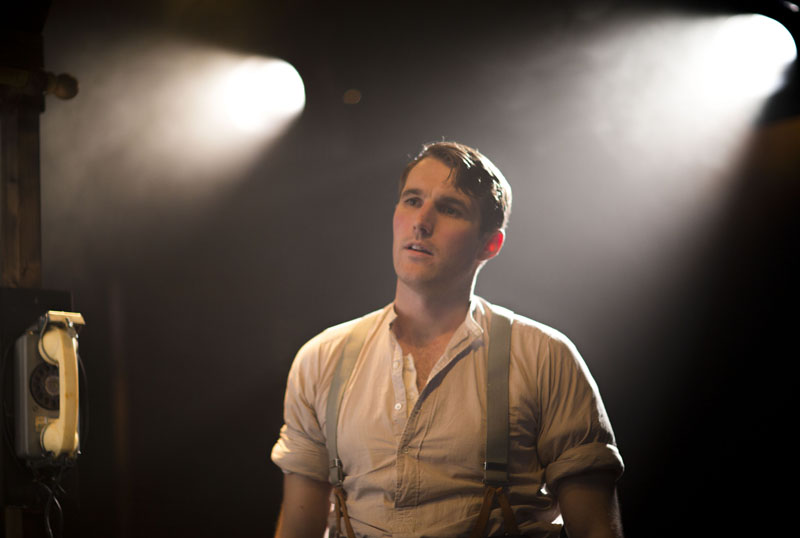 "My first attempt at a play, rather inevitably," Arthur Miller once wrote, "had been about industrial action and a father and his two sons, the most autobiographical work I would ever write."
"My first attempt at a play, rather inevitably," Arthur Miller once wrote, "had been about industrial action and a father and his two sons, the most autobiographical work I would ever write."
You may not have heard of Miller's play No Villain. It was his first, written when he was just 21, and submitted for the $250 Hopgood Award in drama at the University of Michigan, where he was studying in 1936. As the prize was worth about a quarter of the average family income at the time, it was extremely valuable to the Miller family, who had become impoverished during the Great Depression of the early-30s in the USA.
That you are reading about it now and can go and see it at London's Trafalgar Studios, is thanks to director Sean Turner, who worked doggedly to unearth this previously unpublished and unperformed play with the explicit aim of exploring the roots of Miller’s playwriting skills. So Turner has earned his place among Miller scholars for this invaluable insight into the development of one of America’s greatest playwrights. In this production, first seen at Islington’s Old Red Lion Theatre, he directs a close-knit cast in a way that lets Miller’s early voice shine through in all its youthful vigour, whatever the inevitable imperfections.
The plot is what would become familiar Miller territory, the family tensions between fathers and sons, here in a New York Jewish family, all bound up in a moral dilemma that explores the contradictions between soulless capitalism and the hopes and desires of the individual. In this self-avowedly autobiographical world, would-be communist Arny (a suitably chippy Alex Forsyth) comes home from University to find his father’s coat business on the point of collapse, precipitated by a recently-unionised workers’ strike that stops him shipping his output to customers. His struggling father Abe (David Bromley) and older brother Ben (George Turvey) urge Arny to help them save the business by getting out the orders, but Arny is trapped between loyalty to both his own family and a wider cause.
David Bromley’s Abe is full of the frustrations and tensions of a man whose business has already run down and is now finally collapsing. He is supported by that other Miller trope – his long-suffering wife – brought to life in a somewhat underwritten part by Nesba Crenshaw, with both actors capturing a real sense of time and place. George Turvey does sincere justice to the part of Ben, effectively Miller’s advocate, a good man who sees and tries to balance everything that life throws at him but finally accepts that that things fall apart and the centre cannot hold.
Helen Coles, Michael Lyle, Kenneth Jay and Stephen Omer brace the main characters with vivid character sketches in a variety of those supporting roles (kid sister, worker, grandfather born in the shtetl, rabbi, businessman, doctor…) we would now anticipate in a Miller play. Max Dorey’s small set evokes both the family home and the garment factory, where his realisation of those rails of white coats behind the action in the factory peoples the stage with an eerie chorus of extras, and he takes us from home to factory with a simple but effective switch. The lighting (Jack Weir), sound and original composition (Richard Melkonian), along with Natalie’s Pryce’s costumes, all help engender a real feel of 1930’s New York.
There’s plenty of recognisably Miller-style language, full of vivid, lyrical imagery and a heightened tone that still sounds real. Yet there’s a certain overall coolness in the delivery of Miller’s lines here that doesn’t quite capture the colour and humour of Jewish New York. In the end, it’s a play for Miller aficionados and theatre buffs who like to collect the rare. If you are one of these, it won’t disappoint. If you are not, it still gives a vital insight into the roots of one of the most important prolific and playwrights, not just in American theatre, but on the world stage.
By Judi Herman
No Villain runs until 9 July, 7.45pm & 3pm, £15-£30, at Trafalgar Studios, 14 Whitehall, SW1A 2DY; 0844 871 7632. www.atgtickets.com/venues/trafalgar-studios
JR OutLoud: In light of Venice Ghetto 500, actor Michelle Uranowitz talks to JR about playing Shylock's daughter as part of the anniversary celebrations
As the celebrations to mark the 500th anniversary of the Venice Ghetto continue, excitement mounts over the first ever performances of Shakespeare's The Merchant of Venice in the Ghetto itself (26-31 July). JR's arts editor Judi Herman will be talking to various members of the cast and creative team in the coming weeks, but first spoke to American actor Michelle Uranowitz about playing Shylock's rebellious daughter Jessica in Venice.
Visit www.themerchantinvenice.org for more info.
Review: The Flying Lovers of Vitebsk ★★★★★ – An unforgettable flight of imagination
 Marc Chagall and his beloved Bella would surely have loved this magical synthesis of moving pictures, words, music and song. It is also a glorious and seamless synthesis of the talents of a superb creative and performing team.
Marc Chagall and his beloved Bella would surely have loved this magical synthesis of moving pictures, words, music and song. It is also a glorious and seamless synthesis of the talents of a superb creative and performing team.
Writer Daniel Jamieson and director Emma Rice got to know the couple intimately when they played the roles in an early version of his play. Now they return to realise their vision anew and share it with a new audience. Of course the two multi-talented actors, Marc Antolin and Audrey Brisson, are at the heart of the vision, bodies intertwining as they sing and speak, and seemingly floating above Sophia Clist’s quirky Chagallesque machine for acting on, all crazy angles, rakes, beams and crannies thanks to Etta Murfitt’s choreography and Malcolm Rippeth’s gorgeous, painterly lighting.
Brisson is an accomplished acrobat, her background with Cirque du Soleil, as well as a soprano with a glorious voice and Antolin matches her note-for-note, move-for-move. But there are actually four performers on stage more or less throughout – composer Ian Ross, together with fellow multi-instrumentalist James Gow, plays his own haunting atmospheric music, often with a klezmer vibe as appropriate, underscoring most of the action. And they play a range of supporting roles in the story, moving from side to centre stage as the story demands.
So the production ravishes the senses, it’s a sort of total immersion in the world Chagall creates in his paintings. And happily Jamieson spins the story of the lives and loves, the talents and aspirations of Chagall, and Bella too. He conjures their world in early 20th-century Europe, from Vitebsk to Moscow in the East, to the heady Paris of iconoclastic new art movements, Fauvism and Cubism in the West. So Jamieson effortlessly introduces the promising but poor young artist and the daughter of the wealthy owners of a trio of jewellery shops. Bella’s recollection of their first meeting is deliciously sensual and sexy, wonderfully reinforced by the intertwining of the lovers’ limbs, hers clad in bright scarlet, for Clist’s costumes vividly evoke the figures of the lovers in Chagall’s paintings.
Both are caught up in the world-changing events of the First World War and the Russian Revolution and are affected by the antisemitism and pogroms that swept across Eastern Europe. Tellingly, this makes the second half altogether a darker and more monochrome affair than the bewitchingly colourful first half. Life in a Moscow torn by war and revolution is dreary for Bella, left alone all day while Chagall seeks to make a living working in an equally dreary bank until he tries to make his mark under the new order.
Unsurprisingly, but almost heartbreakingly, Bella, one of the four brightest students in Russia, subsumes her potential, even as she recognises and encourages her husband’s genius. She reproaches him surprisingly gently for his selfish tunnel vision, especially considering he misses the birth of their daughter Ida by several days because he is absorbed in finishing work on a series of canvases.
Nonetheless Bella gets to take acting classes with Stanislavsky and later works with the legendary Yiddish theatre actor Mikhoels, so it is thanks to her that Chagall is commissioned to paint backdrops for the Jewish Theatre; work that proves to be among his favourite and most fulfilling.
As they migrate across Europe and then flee to America, they take with them the baggage of the world of the shtetl, movingly evoked by objects and animals from the paintings that they carry or wear as headgear – a cockerel here, a cow there, and an etrog (the lemon-like citrus fruit used ritually at the Jewish harvest festival Sukkot) to boot. Thus the stage is peopled not just by the cast of four, but by images of a lost world. At one point it's almost heartbreaking when you see a painting of a fleeing rabbi created by Chagall as he falls into an exhausted sleep, his arms provided by Bella’s (protruding through holes in the canvas), which chimes with the flight of refugees across Europe today, just as Jamieson intended.
Eventually they reach safety in New York and it takes Bella's death during the Second World War to wake Chagall from the solipsistic tunnel vision of the selfish artist and go some way towards realising her potential by publishing her writings before his return to Europe. There his work flowers, he settles with his second wife Valentina, and ends his days in the South of France.
But let’s leave them looking back at the height of their love, early on that glorious morning of his birthday when she surprised him by flitting over his windowsill bearing armfuls of colourful flowers. There’s a gorgeous synaesthesia in a declaration of Chagall's: “My whole life is pervaded by the colour of loving you”, and it’s wonderfully realised in this transcendent production.
By Judi Herman
The Flying Lovers of Vitebsk runs in Bristol until Saturday 11 June, 7.30pm & 2.30pm, £7.50-£30, Bristol Old Vic, BS1 4ED; 0117 987 7877. www.bristololdvic.org.uk
In London from Thursday 16 June – Saturday 2 July, 8pm & 2.30pm, £10-£62, at Shakespeare’s Globe, 21 New Globe Walk, SE1 9DT; 020 7902 1400. www.shakespearesglobe.com
In Southampton from Tuesday 5 – Saturday 9 July, 7.30pm & 2.30pm, £10-£25, Nuffield Theatre, SO17 1TR; 023 8067 1771. www.nuffieldtheatre.co.uk
In Cornwall from Thursday 14 – Sunday 31 July, 7.45pm & 3pm, £14-£32, Lost Gardens of Heligan, PL26 6EN; 01872 262466. www.hallforcornwall.co.uk
Review: The Threepenny Opera ★★★★ – Worth paying rather more than half a sixpence to see
 When is an opera a play with music? When it’s Simon Stephens’ sharp new reworking for the National Theatre of Brecht’s adaptation of John Gay's 1728 ballad opera (The Beggar's Opera). The perfect match of Kurt Weill’s thrilling, chilling music and Bertolt Brecht’s update of John Gay’s comic, heartless satire seems as timely and timeless as ever in Rufus Norris’s new production.
When is an opera a play with music? When it’s Simon Stephens’ sharp new reworking for the National Theatre of Brecht’s adaptation of John Gay's 1728 ballad opera (The Beggar's Opera). The perfect match of Kurt Weill’s thrilling, chilling music and Bertolt Brecht’s update of John Gay’s comic, heartless satire seems as timely and timeless as ever in Rufus Norris’s new production.
Brecht and Weill’s ‘play with music’, based on Elisabeth Hauptmann’s translation, opened in 1928, two hundred years after Gay’s first night. Brecht and Weill continued the short and intense collaboration that produced Mahagonny, Happy End and more in the years leading up to the rise of National Socialism. GW Pabst’s film adaptation of Die Dreigroschenoper opened in the more dangerous Germany of 1931, and by 1933, the Jewish Weill and his Austrian wife actor/singer Lotte Lenya (the first Polly) had fled Nazi Germany, emigrating to the USA by 1935, followed by Brecht and his Austrian Jewish wife, actor/director Helene Weigel (the first Mother Courage). Their ‘opera’ had pride of place in the ‘degenerate music’ exhibition curated by the Nazis in Dusseldorf in 1938.
Weill’s ‘avant-garde’ music for the show has become a vital part of our musical landscape but the unwieldy storyline has been wrestled by Stephens into a clearer plot in which London – and its underworld – pull out the stops for a coronation. There’s no consideration of financial crisis as there was in the original but it’s still a monumental fable of the corrupting power of unprincipled sex, money and violence, wrapped up in Brechtian mode for the modern audience.
Vikki Mortimer’s rough and ready design, all staircases and stage flats through which the cast hurl themselves, leaves plenty of space on the front of the vast Olivier stage for David Shrubsole's onstage band to take to that stage and for choreographer Imogen Knight to thread the 20 strong cast through the set. Her effectively grungy, louche costumes give the nod to Otto Dix’s paintings, but you might bump into any of this unsavoury lot in London 2016.
George Ikediashi (aka cabaret performer Le Gateau Chocolat) as the Balladeer, an imposing figure with a huge (yes, chocolatey) voice, gets the show off to a barnstorming start with the Ballad of Mack the Knife. His dark tale is told as a sort of Grand Guignol puppet show in a larger-than-life flimsy paper Punch and Judy booth – with ‘Mackie’ as a cross between Jack the Ripper and Mr Punch, his victim’s guts spilling colourfully over the booth. So the scene and tone are set for a tale that wears its heartlessness on its grubby, grungy sleeve by the time Nick Holder’s superb, exuberantly amoral Peachum gets to set out his stall, singing his Morning Song – with its delicious tune that Weill shrewdly realised he should lift straight from Gay’s original ballad opera. Peachum ruthlessly deploys his gangs of hooded beggars (divided into types 1-4: war veterans, immigrants, teenage runaways and unhoused lunatics) integrating hapless newbie Filch just in time for the rich pickings he anticipates at the forthcoming Coronation.
He'd like to be equally ruthless with his womenfolk at home, but Haydn Gwynne’s comically cartoonish Mrs Peachum is a match for him. She's drunken and randy, bent on revenge when she discovers her errant daughter Polly has eloped with one of her own squeezes, übervillain and gangleader Macheath. And she’s all angular limbs in black stockings and garters hardly covered by the clinging scarlet swathes of her dress as she crawls up a scaffolding ladder to find Polly’s ‘room’ at the top empty. But Polly is more than a match for both her parents – and pretty well anyone else who crosses her. The brainy, bespectacled lass in her purposeful cardie comes across as more than resourceful and articulate in Rosalie Craig’s stunningly intelligent and gloriously sung performance. Thankfully, Pirate Jenny’s Song (the tale of the servant girl who dreams of becoming a ruthless pirate who can order the deaths of the insulting bosses and customers she serves) is restored to Polly here (sometimes it is sung by the character Jenny Diver – of whom more later). It sends shivers up the spine, just as it should – no wonder Macheath’s gang listen in awe, stifling their sexist remarks and regarding his new bride with new respect. No wonder he makes her his ‘business partner’ with alacrity!
Central to this play with music is the infamous Macheath, described by Brecht as a ‘short, stocky man of about 40 with a head like a radish, a bit bald but not lacking dignity, someone who impresses women less as a handsome man than a well-situated one’. Rory Kinnear makes an impressive singing debut and it’s good to see the part played as Brecht intended rather than as a lovable rogue or misunderstood bad boy. Kinnear’s Macheath is no slacker when it comes to chilling and thrilling. His casual cruelty belies his fatal attraction to and for the ladies that will prove his eventual downfall. The thrills come from the melodious rounded tones of his singing voice, in this, his first sustained singing role.
Polly is well matched, by Debbie Kurup’s comically indignant foul-mouthed Lucy Brown, her rival in love, to whom Macheath has also promised himself and gives as good as she gets in their Jealousy Duet; and by Sharon Small’s Jenny Diver, the fragile, damaged tart with a wounded heart who shops Macheath to the Peachums. Small gets to sing Surabaya Johnny, a happy interpolation from Happy End – it’s such a great number that the ‘end’ seems to justify the means.
Peter de Jersey also impresses as Lucy’s father Tiger Brown, the gleefully corrupt Chief Inspector of Police who is hand in glove with Peachum, his old mucker from the armed forces– together they make a deliciously malign double act in this pantheon of vicious characters.
Director Rufus Norris shoves in all the usual Brechtian techniques, from props labelled 'DRUGS' and the cast shouting ‘scene change’ or ‘interval’ to remind us we are watching theatre and not real-life and they palpably add to the enjoyment of the opera as entertainment. But perhaps the sheer pace of the performance gives little space to reflect on the predicament of the characters and their reality in the theatre of life. This is left to powerful actor and wheelchair user Jamie Beddard, like so many disabled actors, a natural Brechtian, whose physicality and vocal quality is a constant reminder of his reality.
By Judi Herman
The Threepenny Opera runs until Saturday 1 October, 7.30pm & 2pm, £15-£45 at National Theatre South Bank, SE1 9PX; 020 7452 3000. www.nationaltheatre.org.uk




